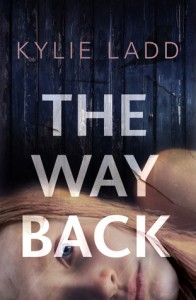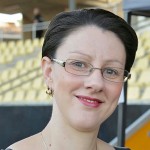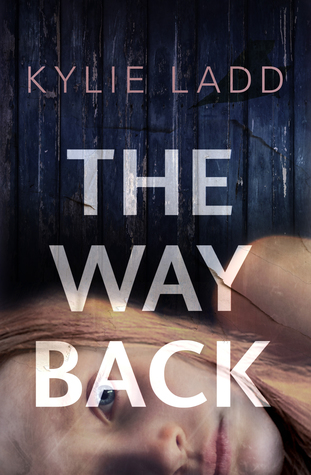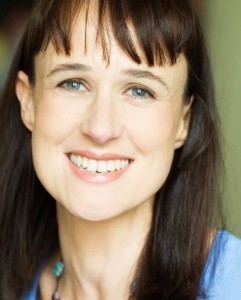Welcome to an in-depth edition of Sunday Spotlight. With just two days left until the release of her gripping and much anticipated fifth novel, The Way Back, Kylie Ladd joins us today in this delightfully frank interview to talk about writing, reading, a few of her favourite things, and the story behind the story.
When did you start writing and what was the catalyst?
I’ve been writing ever since I could read, which I think is pretty standard for novelists… as soon as we start enjoying stories we want to create them for ourselves. My first works were actually what I know now as fan fic- I was utterly obsessed with The Brady Bunch as a child and spent a large part of my grade one year at school writing stories about various characters from the show, but especially Marcia. What can I say? I’m an oldest daughter. We ALL wanted to be Marcia.
How has being Australian AND a woman impacted on your writing and/or writing career?
Interesting question! Mostly positively, in that as both those things I am part of a wonderful community of readers and writers, and am very grateful for that. That said, it sets my teeth on edge that the genre in which I write, commercial fiction, is often labelled “women’s fiction”, and that that term is often used at worse disparagingly and at best to over-simplify and pigeonhole an astonishing array of stories and skills. Funny how no-one ever markets “men’s fiction”… My teenage daughter wants to be a novelist, and I hope (perhaps naively) that by the time she is there will be no such divisions, that all novels will be judged on what they have to say and how they say it, as opposed to the gender of the author or the readership.
What authors and types of books do you love the most?
Fiction was my first and remains my enduring love. Tell me a (good) story and I’m yours forever. I’ll read pretty much anything, though tend mostly towards contemporary Australian novels, both literary and commercial… Tim Winton, Christos Tsiolkas, Fiona Higgins, Malcolm Knox, Liane Moriarty. I’m in awe of Toni Jordan and Eliza Henry-Jones, plus I’ve recently really enjoyed books by Holly Throsby, Lia Weston, Lisa Ireland and Peggy Frew… for a relatively small country we have an incredible depth of talent.
What is your favourite childhood book? Did reading as a child have any bearing on your decision to become a writer?
I pulled Picnic at Hanging Rock by Joan Lindsay off my grandmother’s bookshelf when I was about ten and being minded by her for the day during the summer holidays while my mother was at work. It was hot, I was bored, and I chose the book for no other reason than it had a picture of a pretty girl in a long white dress on the cover. That girl was Miranda, beginning her ascent of the rock with her school friends, and within ten pages I was hooked. I took it out onto the front lawn, lay down under a tree, and read it until mum drove up about seven hours later and seemed put out that I hadn’t had any lunch. It was- is- a magical, evocative read, and writing this now I can’t help but think (for the first time) that it must have had some part in the genesis of The Way Back almost forty years later. Goosebumps!
What inspired The Way Back?
I first became interested in the ideas behind The Way Back over a decade ago, when US teenager Elizabeth Smart was reunited with her family nine months after she was abducted from her bedroom in the middle of the night; nine months in which the Mormon girl had been regularly bound, drugged and raped. The media focussed mostly on the details of her captivity and release, though what really intrigued me was how on earth Elizabeth could possibly recover from what she had been through- would it warp and twist the rest of her life, could she ever put the anger she must feel and the abuse she had suffered behind her? Elizabeth later wrote a memoir, claiming to have done just that… but then, it seemed to me at least, long-missing girls started turning up everywhere. Jacyee Duggard, kidnapped 18 years previously and recovered in 2009; Natascha Kampusch, abducted as a ten-year-old in Austria in 1998 and held for almost nine years; Amanda Berry, Gina DeJesus and Michelle Knight, imprisoned, bashed and raped in a Detroit house for a decade.
As both a psychologist and a writer what fascinated me wasn’t so much how these girls had endured what they did, but how (and if) they were able to pick up the pieces of their old lives and start again. The lost child is a popular trope in Australian arts and literature, but I was interested in exploring this from a slightly different angle: not focussing on the loss per se, but what happens next, when what is lost is found. And then too, there was this: when I was eight years old, a classmate of mine was abducted from her bed in an upmarket Melbourne suburb in the middle of the night. Despite a manhunt and media frenzy that was at least the equal of the Daniel Morcombe case a quarter of a century later, Eloise was never recovered. The Way Back is not about her, but is in memory of her. It is about enduring not only an abduction, but also the return to daily life that comes afterwards, and whether such victims are ever truly released.
The Way Back explores the trauma of child abduction. How did you go about researching this?
The usual way- with Google! At least to start with, though I then refined this by reading journal articles, text books and memoirs. I have a PhD in neuropsychology and have always loved doing research- I’d be happy to keep researching forever, particularly if that meant I could put off any actual writing, which scares me to death. The memoirs of women like Smart and Duggard though got in my head and wouldn’t let me go… in the end the only way to shake them loose was to start the novel and live in that story.
Did you plan/plot the entire story from beginning to end, or let it evolve naturally as the writing progressed? In terms of characters, were they already a firm picture in your mind before you started writing or did they develop a personality of their own as the story progressed?
I am, sadly, a plotter. I say sadly because I have a great respect for and envy of those writers who can just sit down at a blank page and emerge some time later with a book- that’s real magic, mine is just hard graft! I begin by writing down a rough story arc, then develop that into sections, then develop those sections into chapters, all of which are plotted in an XL spreadsheet (I believe Scrivener is way better, but I am a technophobe who only got her first mobile phone just over a year ago and is doing well, quite frankly, to not be using a slate). With regard to characters, I jot down notes about them in an exercise book while I’m plotting the novel, then at some stage I sit down and really think about them- what they might like to eat or wear or watch, how they’d spend a Sunday afternoon, where they’ve come from, what they wouldn’t want me to know about them- and then I look through magazines or the paper until I find what I think they look like, and then I cut that out and stick it in the exercise book, and oh my god I am such a dork to even be admitting all this. Sigh. Even with all that groundwork, I find writing a slow and laborious process, which is why my Twitter avatar features a turtle on a keyboard. The upside, though, is that while I write reallllly slowly, I don’t do much rewriting- I’ve rewritten each sentence in my head ten times before I commit it to the page. With one exception, all my five novels are either second or third drafts, which isn’t the way you’re supposed to do it according to all the writers’ manuals. Shhhh.
The Way Back deals with some heavy subject matter. How long did it take you to write this novel? As a parent of teens yourself, did you feel as though you needed to step back at any point, take a break and come back to it with a clear head/heart?
The Way Back *was* hard to write, much harder than any of my other books, and by the end I was simply calling it TFN, for That F*cking Novel. It took almost three years (the others took about 12-18 months) and yeah, nearly killed me. I just found the subject matter such hard going, especially as a parent, as you say… and to really make things worse my lovely mum became sick with cancer just after I started and died two days after the edits were in. I wrote the last section of the book in a bit of a haze of grief and exhaustion, to be honest, but looking back now that wasn’t necessarily a bad thing. It certainly gave me a deeper, closer understanding of what it is to lose someone you love, and it was somewhere to go with my pain. It’s funny how things turn out.
As a writer of contemporary novels, have you ever had to deal with a situation where someone feels they recognise traits of themselves in one of your characters?
Yes, quite regularly, particularly as I also tend to set my novels geographically in the places I live or frequent. If anyone complains I act all offended and remind them that I am a writer, an artist- that creating is what I do, and all my works are solely the product of my fertile imagination. But just occasionally they, ah, might have a point, so I always keep my fingers crossed behind my back as I say it ;).
Can you tell us something about yourself that not many people would know?
Hmmm- that I have double-jointed elbows? That I subsist largely on a diet of hot chips? That I am hopelessly emotional and cry at Qantas ads and at the end of every single episode of Project Runway? I’m not proud of that, but it makes my kids laugh.
If you could sit down for an afternoon with an iconic person from history, who would you choose to spend that time with?
TS Eliot, one of my favourite poets. We’d talk about The Love Song of J. Alfred Prufrock and I’d warn him about Cats.
A psychic has told you about your past life. Who were you and what did you do?
Wow! I have no idea, but I’m terrified of fire, so possibly I was Joan of Arc.
When did you discover the Australian Women Writers Challenge? Do you think the challenge has had any impact on the awareness and discoverability of Australian Women writers? Have you personally benefited in terms of exposure of your work to new readers?
I discovered the Australian Women Writers Challenge through Twitter when it first began in 2012- and what a fabulous idea it was! It’s definitely brought writers I didn’t know about to my attention, and I know I’ve benefitted as an author in terms of exposure through the AWWC network too. All my previous novels have been reviewed by AWWC bloggers, and I love how the site links all my (and other) writers’ reviews together in one place… it’s a wonderful resource, and I couldn’t admire more the work it does in raising the profile of female writers. On a more personal note, I also have to add that it has helped me find my tribe- like-minded souls, readers and writers, who became first my online community, and in many cases my real-life friends.
 About The Way Back – Releasing August 1st, 2017:
About The Way Back – Releasing August 1st, 2017:
All she wanted was to escape. But why does she still feel trapped? A gripping psychological drama by the author of Mothers and Daughters and Into My Arms.
Charlie Johnson is 13 and in her first year of high school. She loves her family, netball and Liam, the cute guy who sits next to her in Science – but most of all she loves horses and horse-riding. Charlie’s parents have leased her a horse, Tic Tac, from the local pony club, but one day they go out for a ride in the national park and only Tic Tac returns…
Four months later, long after the police and the SES have called off the search, Charlie is found wandering injured and filthy, miles from where she was last seen. Her family rejoice in her return, but can anyone truly recover from what Charlie’s been through? When a life has been shattered, how do you put the pieces back together?
I was lucky enough to get an early copy of The Way Back from Allen and Unwin for review. You can read my thoughts on this remarkable novel over at my blog, Theresa Smith Writes.
 About Theresa: Writer, avid reader, keen reviewer, book collector, drinker of all tea blends originating from Earl Grey, and modern history enthusiast. I enjoy reading many genres but have a particular interest in historical fiction. You can find me and all of my book related news and reviews at: Theresa Smith Writes, Facebook, Goodreads, Twitter @TessSmithWrites.
About Theresa: Writer, avid reader, keen reviewer, book collector, drinker of all tea blends originating from Earl Grey, and modern history enthusiast. I enjoy reading many genres but have a particular interest in historical fiction. You can find me and all of my book related news and reviews at: Theresa Smith Writes, Facebook, Goodreads, Twitter @TessSmithWrites.






